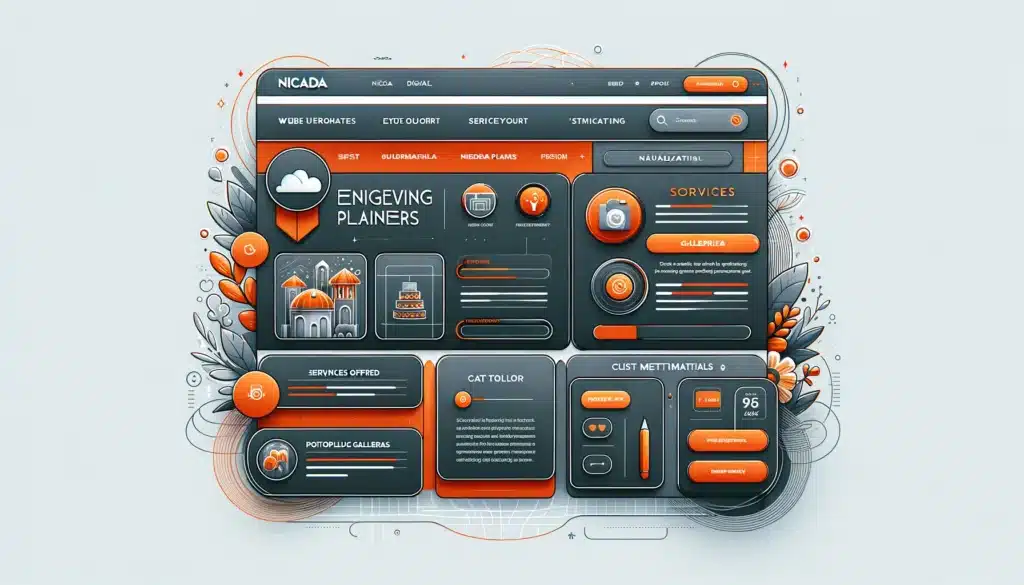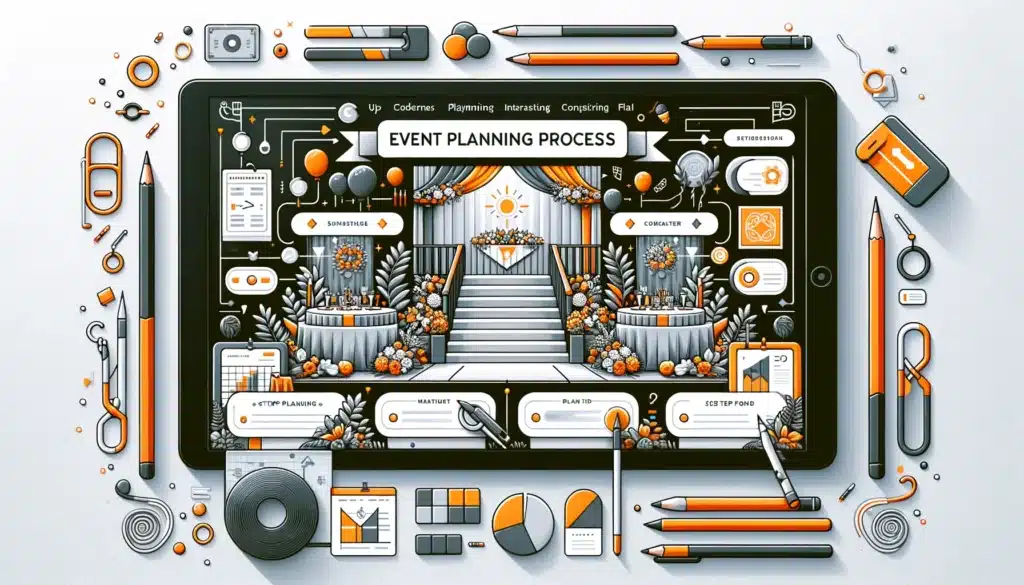
Are you an event planner looking to stand out in the digital world?
In today’s competitive market, having a personalised website is essential for showcasing your unique services and attracting potential clients.
At Nicada Digital, we specialise in creating custom websites for event planners that not only look stunning but also drive organic traffic and increase online visibility. From user-friendly navigation to compelling visual design, our team ensures that your website is optimised for success.
Join us as we explore the key elements, benefits, and strategies of effective web design for event planners, and discover why Nicada Digital is the top choice for your online presence.
Key Takeaways:
Having a personalised website is essential for event planners to showcase their services and stand out in a competitive market.
An effective event planner website should have user-friendly navigation, compelling design, and clear call-to-actions to attract and convert potential clients.
Nicada Digital is the best choice for event planners looking for professional web design services with a focus on SEO, social media integration, and responsive design.
What’s included as standard?
Free SSL Certificate for website security (12 months).
Free domain registration (12 months).
Website created with user experience design (UX) in mind
Fast, free hosting (12 months).
Free website related business email (for example in**@yo********.com).
Mobile responsive design for all devices.
30 days support with ongoing monthly website maintenance option if required.
Enquire Today
Simply fill out the form or call us on
0161 486 6048

Introduction to Web Design for Event Planners
Regarding event planners, having a well-designed website is crucial for showcasing their services and attracting potential clients.
Event planners rely heavily on their websites to communicate the range of services they offer, such as wedding planning, corporate events, or special occasions. A professionally crafted website not only serves as an online portfolio but also as a digital storefront that can impress visitors and convert them into customers. Through an intuitive user interface and visually appealing design, event planners can effectively showcase their expertise and creativity.
Why Event Planners Need Individual Websites
Event planners benefit significantly from having individual websites that showcase their expertise and services tailored for corporate events, weddings, and branding initiatives.
This online platform acts as a virtual business card, allowing event planners to highlight their unique selling points, portfolios, and testimonials in one centralised location. Potential clients can easily access information about the planner’s experience, past projects, and areas of expertise, thereby helping to build credibility and trust. Having a dedicated website enhances professional branding, enabling event planners to establish a distinct online presence and stand out in a competitive market.
Benefits of Having a Personalised Website
Personalised websites offer event planners like Ayomide and Chappelow Events the opportunity to showcase their work effectively, present client testimonials, and establish social proof for their services.
Showcasing work: A key benefit of personalised websites for event planners is the ability to create visually appealing galleries and portfolios of their past events. This allows potential clients to get a glimpse of the planner’s style and expertise, helping them make informed decisions.
Incorporating testimonials: By featuring client testimonials on their websites, event planners can build credibility and trust. Positive reviews from previous clients serve as powerful endorsements of the planner’s capabilities, convincing potential clients of their professionalism.
Leveraging social proof: Personalised websites enable event planners to showcase their awards, press mentions, and social media presence, enhancing their reputation and attracting more business opportunities. This social proof acts as a validation of the planner’s expertise and quality of service, reinforcing their brand image.

Key Elements of Effective Event Planner Websites
Effective event planner websites prioritize elements such as engaging galleries, seamless user experiences, and clear call-to-actions to drive conversions.
These websites often feature visually stunning photo and video galleries showcasing past events, venue options, and decor inspirations. This not only captures the attention of potential clients but also provides them with a glimpse of the quality of work offered.
A user-friendly interface is crucial for a smooth browsing experience. From easily accessible navigation menus to intuitive search functions, every detail is meticulously designed to enhance user experience and encourage visitors to explore further.
Strategic placement of call-to-action buttons and forms is vital to guide visitors towards desired actions, such as requesting a quote, booking a consultation, or subscribing to newsletters. These prompts, when strategically positioned, nudge users towards conversion without being intrusive.
User-Friendly Navigation
User-friendly navigation on event planner websites ensures easy access to relevant information, optimises visual hierarchy for user engagement, and enhances SEO performance.
Keyword integration plays a crucial role in enhancing SEO for event planner websites. By strategically incorporating relevant keywords into the website content and navigation menus, the site becomes more visible to search engines, driving organic traffic.
Achieving a clear visual hierarchy through intuitive menu structures and well-organised content helps users easily find the information they seek, improving their overall experience on the site. Implementing proper SEO techniques not only boosts search rankings but also increases the site’s credibility and trustworthiness in the eyes of search engines and users alike.
Compelling Visual Design
Compelling visual design elements like portfolios, galleries, and consistent branding contribute to the aesthetic appeal and professionalism of event planner websites.
Portfolios act as a showcase of past events, allowing potential clients to gauge the planner’s style and expertise.
Image galleries provide a visual feast, offering vivid glimpses of successful events and inspiring future possibilities.
Cohesive branding reinforces the planner’s identity and creates a memorable impression on visitors.
A harmonious blend of colours, fonts, and imagery across the website helps in establishing a strong brand presence.
This attention to detail enhances the overall user experience and builds trust with prospective clients, highlighting the importance of visual elements in making a lasting impact.
Clear Call-to-Actions
Clear and strategic call-to-actions guide visitors on event planner websites to take desired actions, such as exploring services, engaging with social media integration, and initiating event planning inquiries.
Effective call-to-actions serve as virtual signposts, directing visitors towards key areas of interest on an event planning website. These prompts not only aid in navigating the site but also encourage interaction and engagement. They create a seamless user experience, prompting individuals to further explore the services offered, connect through various social media integration platforms, and delve into the intricacies of the event planning process. Incorporating well-crafted call-to-actions can significantly enhance user engagement and streamline the path to converting website visitors into potential clients.
Importance of SEO for Event Planner Websites
SEO plays a vital role in enhancing the online visibility of event planner websites and driving organic traffic to attract potential clients.
- By optimising website content with relevant keywords
- Implementing effective link building strategies
event planners can ensure that their websites rank higher in search engine results pages. This increased visibility not only helps in attracting more traffic but also establishes credibility and trust among users. Proper SEO techniques such as creating informative and engaging content, optimising meta tags, and improving website speed can significantly enhance the user experience, ultimately leading to higher conversion rates and increased revenue for event planning businesses.
Increasing Online Visibility
Optimising user experiences by ensuring seamless navigation, fast loading times, and engaging content can enhance visitor engagement and encourage them to explore more services and offerings.
Driving Organic Traffic
Driving organic traffic to event planner websites requires creating engaging blog content, incorporating relevant keywords, and optimising visual hierarchy for search engine visibility.
Regarding blogging, consistency is key. Regularly publishing high-quality, informative posts not only keeps your audience engaged but also signals to search engines that your website is active and relevant.
Utilise long-tail keywords strategically in your blog content to attract targeted traffic and improve your SEO rankings.
Pay attention to the visual elements on your website. Optimise images with alt text and descriptive filenames to enhance the visual hierarchy and provide search engines with more context about your content.
How to Showcase Portfolios on Event Planner Websites
Showcasing portfolios effectively on event planner websites involves creating engaging galleries, highlighting successful events, and maintaining consistent branding for a professional presentation.
One method to captivate visitors with your portfolio is to leverage visually stunning image galleries that showcase your past events in an engaging way. These galleries can be organised by event type, theme, or client, providing a comprehensive view of your expertise and creativity. By spotlighting successful projects, you can establish your track record and demonstrate your capabilities to potential clients.
Integrating Blogs for Event Planning Websites
Integrating blogs into event planning websites enhances user engagement, promotes social media integration, and boosts SEO performance for increased online visibility and credibility.
One major benefit of having a blog on an event planning website is the ability to provide valuable and engaging content to visitors. This not only keeps them interested and informed but also encourages them to stay longer on the site, increasing the likelihood of converting them into customers or event attendees.
By actively sharing blog posts on various social media platforms, event planners can leverage a wider audience reach and create a community around their brand. This social media integration facilitates interaction, discussions, and sharing of content, leading to increased brand awareness and customer loyalty.
From an SEO standpoint, regularly updating a blog with relevant keywords and quality content can significantly improve the website’s search engine rankings. Search engines like Google prioritise websites that consistently produce fresh and informative content, making it easier for potential clients to discover the event planning services offered.
Optimising Event Planner Websites for Search Engines
Optimising event planner websites for search engines involves strategic SEO practices, keyword optimisation, and enhancing user experiences to improve online rankings and attract organic traffic.
One crucial aspect of SEO for event planner websites is conducting comprehensive keyword research to identify the most relevant and high-traffic terms in the industry. By strategically incorporating these keywords into the website’s content, meta tags, and URLs, the site becomes more visible to search engines, increasing its chances of ranking higher in search results.
Focusing on improving user experiences is paramount for keeping visitors engaged and encouraging them to explore the site further. This can be achieved by ensuring fast loading speeds, easy navigation, mobile responsiveness, and clear calls-to-action on the website.
Benefits of Social Media Integration for Event Planner Websites
Social media integration offers event planner websites the benefits of increased exposure, enhanced brand visibility, and the opportunity to share testimonials for building credibility and engagement.
By integrating social media platforms into their websites, event planners can tap into a vast online audience, reaching potential clients on a global scale. This exposure not only helps in attracting new customers but also in building a loyal following. Through social media integration, event planners can effectively showcase their expertise, services, and past successful events, thus enhancing brand visibility and recognition in the competitive market.
Managing Event Registrations on Event Planner Websites
Efficiently managing event registrations on event planner websites requires seamless user experiences, clear registration processes, and effective communication channels to streamline attendee sign-ups.
- One effective method to optimise user experience on event planner websites is to implement a simplified registration form, utilising interactive form fields and progress indicators to guide users through the process smoothly.
- In addition, providing clear instructions, highlighting important deadlines, and offering instant confirmation emails upon registration can enhance the clarity of the registration process, ensuring attendees have a seamless experience from start to finish.
- Establishing efficient communication channels, such as automated event reminders, personalised updates, and real-time customer support, can significantly improve attendee engagement and satisfaction, ultimately leading to successful event enrolments.
Importance of Responsive Design in Event Planner Websites
The importance of responsive design in event planner websites lies in providing optimal user experiences across devices, ensuring mobile optimisation, and enhancing accessibility for a wider audience.
Responsive design ensures that event websites can adapt seamlessly to various screen sizes and resolutions, presenting content in a visually appealing and user-friendly manner. This flexibility plays a crucial role in engaging visitors and potential clients, as it allows them to navigate the site effortlessly, regardless of the device they are using.
User experience optimisation through responsive design also contributes to reducing bounce rates and increasing conversions, ultimately benefiting the business. With the prevalence of mobile browsing, having a mobile-friendly website is no longer optional but essential in reaching a broader audience and maximising visibility in search engine results.
DIY vs. Professional Management of Event Planner Websites
Choosing between DIY and professional management of event planner websites involves considerations of technical expertise, design capabilities, and user experience priorities to ensure an effective online presence.
When opting for a DIY approach to managing event planner websites, individuals with a knack for technology may find themselves excited at the prospect of customising their platform without the need for external help. This route requires a fair amount of technical skills, such as coding knowledge, server management, and troubleshooting abilities, to maintain a functional and secure website.
On the other hand, professional management services offer a range of benefits for event planners. Professionals bring specialised expertise in website design, ensuring a visually appealing and user-friendly interface that is essential for attracting and retaining visitors. Their focus on user experience guarantees that the website is optimised for seamless navigation and engagement, ultimately enhancing the overall online presence of the event planner.
Effective Strategies for Presenting Testimonials on Event Planner Websites
Implementing effective strategies for presenting testimonials on event planner websites involves showcasing client feedback, leveraging social proof, and aligning testimonials with branding to enhance credibility and trust.
One key aspect in showcasing testimonials is to ensure that they are prominently displayed on the website, making it easy for visitors to find and read them. Utilising visually appealing formats like testimonial carousels or video testimonials can capture attention and engage users effectively. Incorporating client photos or short stories alongside testimonials can add a personal touch and increase relatability. It’s also crucial to respond promptly to any new testimonials and show appreciation for the feedback received.
Conclusion: Choosing Nicada Digital for Web Design Services
Selecting Nicada Digital for web design services offers event planners like Fox Events and Wink Wed the expertise, creativity, and dedication needed to elevate their online presence and attract clients effectively.
With a team of skilled professionals in place, Nicada Digital is well-equipped to tailor unique and visually appealing websites specifically for event planning businesses.
By integrating user-friendly interfaces and responsive design, they ensure seamless navigation for potential clients visiting the site.
The personalised attention provided by Nicada Digital assures event planners that each aspect of their online presence is meticulously crafted to reflect their brand identity and goals effectively.
For event planners looking to make a lasting impression in the increasingly digital age, Nicada Digital is undoubtedly a top choice for web design services.
Frequently Asked Questions
What is web design for event planners?
Web design for event planners is the process of creating a website specifically tailored to the needs and goals of event planning professionals. This type of design takes into account the unique services and offerings of event planners, as well as their target audience and branding.
Why do event planners need a website?
A website is essential for event planners to showcase their services, experience, and past events to potential clients. It also serves as a digital portfolio and a platform to share important information such as pricing, testimonials, and contact details. A website can greatly enhance the visibility and credibility of an event planning business.
How can Nicada Digital help with web design for event planners?
Nicada Digital specialises in creating custom websites for event planners. We understand the unique needs and goals of this profession and work closely with our clients to design a website that accurately represents their brand and services. Our team of experienced web designers will ensure that your website is visually appealing, user-friendly, and optimised for search engines.
What features can be included in a web design for event planners?
There are many features that can be included in a web design for event planners, depending on their specific needs and goals. Some common features include a portfolio page to showcase past events, an about page to introduce the team and their expertise, a services page with detailed information on the types of events they plan, and a contact page with a form for enquiries and bookings.
Why should event planners choose Nicada Digital for their web design?
Nicada Digital has a proven track record of creating successful websites for event planners. We have a deep understanding of the industry and know what it takes to make a website stand out. Our team is dedicated to providing personalised and professional service, ensuring that each website we create is unique and tailored to the specific needs of our clients.
How long does it take to design a website for an event planner?
The timeline for designing a website for an event planner can vary depending on the complexity of the project and the client’s specific needs. Typically, it takes 4-6 weeks for our team to design and launch a website. However, we always strive to work efficiently and meet our clients’ deadlines, so the timeline may be shorter depending on the project requirements.

Please Get In Touch …
Please get in touch and we’ll be very happy to discuss your project requirements and will offer expert, friendly advice.
Phone:
Email:
Website Form:
Times:
Mon – Fri 9am – 5pm
